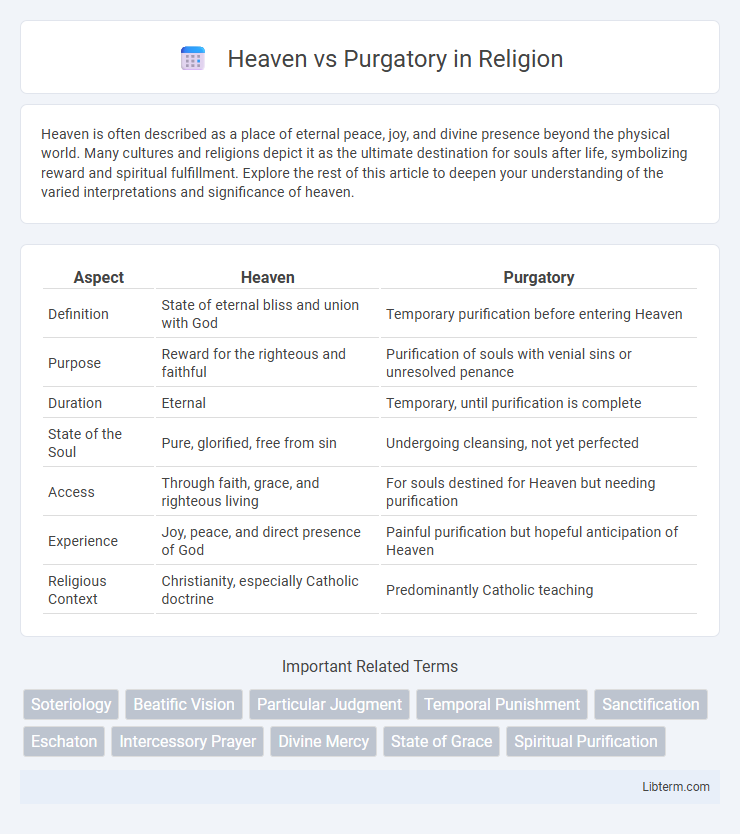Heaven is often described as a place of eternal peace, joy, and divine presence beyond the physical world. Many cultures and religions depict it as the ultimate destination for souls after life, symbolizing reward and spiritual fulfillment. Explore the rest of this article to deepen your understanding of the varied interpretations and significance of heaven.
Table of Comparison
| Aspect | Heaven | Purgatory |
|---|---|---|
| Definition | State of eternal bliss and union with God | Temporary purification before entering Heaven |
| Purpose | Reward for the righteous and faithful | Purification of souls with venial sins or unresolved penance |
| Duration | Eternal | Temporary, until purification is complete |
| State of the Soul | Pure, glorified, free from sin | Undergoing cleansing, not yet perfected |
| Access | Through faith, grace, and righteous living | For souls destined for Heaven but needing purification |
| Experience | Joy, peace, and direct presence of God | Painful purification but hopeful anticipation of Heaven |
| Religious Context | Christianity, especially Catholic doctrine | Predominantly Catholic teaching |
Defining Heaven and Purgatory
Heaven is traditionally defined as an eternal state of perfect bliss and communion with the divine, where souls experience complete happiness and the absence of suffering. Purgatory is understood as a temporary state of purification, where souls undergo cleansing to achieve the holiness necessary to enter Heaven. The distinction lies in Heaven's permanence and perfection, whereas Purgatory serves as a transitional process for spiritual refinement.
Origins in Sacred Texts
Heaven and Purgatory both originate from early Christian theology, with Heaven described as the eternal dwelling place of God's presence and the righteous in texts like the Book of Revelation. Purgatory, however, emerges primarily from Catholic tradition, grounded in interpretations of 2 Maccabees 12:46 and 1 Corinthians 3:15, where a temporary state of purification for souls occurs before entering Heaven. These concepts reflect differing views on the afterlife, with Heaven representing ultimate salvation and Purgatory offering a process of cleansing from sin.
Theological Foundations
Heaven and Purgatory are distinct states in Christian eschatology rooted in the doctrine of the afterlife, where Heaven represents eternal communion with God and the fulfillment of divine grace. Theological foundations emphasize that purgatory is a temporary purification process for souls who die in a state of grace but require cleansing from venial sins before entering Heaven. Scriptural interpretations, such as 1 Corinthians 3:15 and 2 Maccabees 12:46, support the concept of purgatory, highlighting the belief in post-mortem purification aligned with God's justice and mercy.
Entry Requirements and Criteria
Entry into Heaven requires unwavering faith, moral righteousness, and divine grace as outlined in many religious doctrines, emphasizing eternal salvation and union with the divine. Purgatory serves as a temporary purification state where souls undergo cleansing of venial sins or temporal punishment before achieving the sanctity necessary for Heaven. Criteria for Purgatory involve repentance and spiritual growth, allowing souls to attain purity through suffering and prayers, ultimately preparing them for entry into Heaven.
Spiritual Purpose and Outcomes
Heaven represents eternal union with the Divine, embodying ultimate spiritual fulfillment and bliss, while Purgatory serves as a transitional state for purification and spiritual growth. The spiritual purpose of Purgatory is to cleanse the soul from venial sins and imperfections, preparing it for eventual entrance into Heaven. Outcomes in Heaven include eternal peace and union with God, whereas Purgatory culminates in the soul's readiness for that final, perfect communion.
Depictions in Religious Art and Literature
Heaven is often depicted in religious art and literature as a realm of eternal light, divine presence, and ultimate peace, filled with angels, saints, and radiant landscapes symbolizing spiritual perfection. Purgatory, by contrast, is portrayed as a transitional, purifying space where souls undergo cleansing through fire or trials to achieve holiness, represented through imagery of flames, penitents, and somber, contemplative settings. These contrasting depictions emphasize Heaven's fulfillment and joy versus Purgatory's temporary suffering and hope for salvation.
Experiences of Souls: Joy vs. Purification
Souls in Heaven experience eternal joy, peace, and the presence of the Divine, characterized by perfect happiness and the fulfillment of all desires. In contrast, souls in Purgatory undergo purification through suffering and spiritual cleansing, preparing them for eventual entry into Heaven. This process involves temporary trials aimed at purifying residual sins and imperfections to attain ultimate sanctity.
Role in Different Christian Denominations
Heaven is universally recognized across Christian denominations as the eternal dwelling place of God and the righteous, symbolizing ultimate salvation and union with the Divine. Purgatory, however, is primarily emphasized in Roman Catholicism, where it serves as a temporary state for purification of souls before entering Heaven, a belief not shared by most Protestant traditions. Eastern Orthodox Christianity acknowledges a process of purification after death but does not define it as purgatory, highlighting doctrinal differences regarding the afterlife and the fate of souls.
Common Misconceptions
Heaven and Purgatory are often misunderstood as final and equivalent destinations, but theology defines Heaven as eternal union with God, whereas Purgatory is a temporary state for purification. Common misconceptions include the belief that Purgatory is a place of eternal punishment or that it guarantees entry to Heaven without personal transformation. Catholic doctrine emphasizes purgatorial purification as necessary for souls who die in grace yet still need cleansing from venial sins or temporal punishment.
Spiritual Significance for Believers
Heaven represents the ultimate state of eternal bliss and union with the divine, fulfilling believers' spiritual longing for perfection and everlasting peace. Purgatory serves as a transformative process where souls undergo purification, emphasizing hope and God's mercy in achieving spiritual readiness for heaven. This distinction underscores a believer's journey of faith, repentance, and divine grace in the afterlife.
Heaven Infographic

 libterm.com
libterm.com